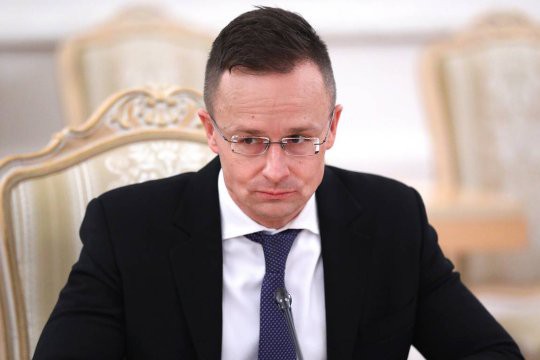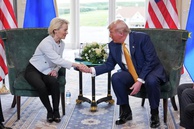Hungarian Foreign Minister Péter Szijjártó has warned: Hungary should be ready for further attacks from Brussels, which is resorting to all kinds of blackmail to exert pressure on the government of Prime Minister Viktor Orban (1). Brussels’ opposition to Hungarian independence comes from differences on the future of Europe, as not just a political alliance, but as a civilization.
The Hungarian prime minister, who is a Catholic believer and a father of five children, speaks in favor of preserving the position of the church and traditional values in the lives of Hungarian people. Among politicians from Orban’s "Fidesz" Party there is a high percentage of families with many children, including President Katalin Novak. Such a dense concentration of orthodox believers within one and the same political party causes discontent from European bureaucrats, who are set on turning Europe into an atheistic civilization of homosexual families. The Hungarian authorities are thus becoming an unwelcome hard-to-control player that stands for the interests of their people and traditional values, rather than the “progressive” innovations of bureaucrats from Washington and Brussels. As a result, the EU has allocated €4 million to Hungarian opposition groups, involved in anti-government protests of past years (2).
Brussels’ and Budapest’s foreign policies have been following different tracks as well. In addition to independence in matters related to family and religion, Hungary has been demonstrating an independent geopolitical thinking. Testifying to this is the recent visit by Katalin Novak to Iraq for talks on a variety of issues, including measures to fight terrorism, humanitarian projects, agreements with Italy on the use by Hungary of the port of Trieste for the export/import of goods in 2026, consultations with Rome on how to counteract illegal migration, partnership with Serbia and Austria for the purpose of strengthening migration control on the borders, and many other issues.
The Hungarian diplomacy’s focus on the Middle East is due, among other things, to the desire to establish direct contacts with alternative energy suppliers. Even though Hungary’s presence in the region is negligible, Budapest seems determined to build it up. Hungary wants to decide on this independently, without mediation from Brussels.
Like Hungary, Serbia and Austria disapprove of western sanctions against Russia. Hungary has even turned to the EU with a request to cross some Russians out from the under-sanctions list, Bloomberg reports. A further liaison of Budapest with Belgrade and Vienna is fraught with the emergence in the Central and Eastern Europe of a three-party union, opposed to the Brussels-Washington Open Balkans project. Officially, Hungary, just as Serbia and Austria, supports the project. However, every Balkan country interprets it differently.
Serbia would welcome a stronger presence of Russia and China in the region. So would Hungary, even though for other reasons. Bulgaria is seeking to boost its influence in North Macedonia. Rumania is striving to build up its military potential in the Black Sea, viewing the Balkans as a land-based support base for spreading Bucharest’s influence along the so-called traco-illiric corridor, which stretches from the Rumanian coast to the coast of Bulgaria. Rumania has assumed the concept of “extended security” (securitate naţională extinsă), which implies activization of Rumanian foreign policy over the space between the Black, Baltic and Aegean Seas. Bucharest views the Balkans as a hinterland of “Greater Rumania”, while “open Balkans” are seen as Balkans without Russian or Serbian influence (4).
In this contest, Budapest remains a covert ally of Belgrade due to the Greater Rumania issue. For Serbia, the Greater Rumania project carries a less pronounced threat, whereas for Hungary, struggling to consolidate the Hungarian irredenta, Greater Rumania is a rival. Rumania’s National Patriots see Rumania as a great nation only on condition it absorbs Moldavia, Trans-Dniester, and the border regions of present-day Ukraine (Northern Bukovina, Bessarabia). Bucharest uses less overt rhetoric but is seeking the same.
The United States and the EU have launched the process of containing Russia in the triangle of the Baltic, Black and Mediterranean Seas. The Balkans, located in the center of the “triangle”, remain a key point in applying Washington’s strategy. Hungary is trying to elaborate a specific strategy, which would enable it to maintain sovereignty and freedom of foreign policy action. Budapest supports euro integration of Western Balkans, but instead of seeing it as instrumental in ousting Moscow and Beijing from the region, it deems it as an opportunity to diversify regional economy and promote the implementation of the diaspora agenda.
Most foreign Hungarians reside in Rumania (more than 1.2 million). Even though Bucharest too, backs euro integration of Western Balkans, its agenda is at odds with that of Budapest. Western Balkans remain an area of fierce rivalry, not only between Washington and Brussels, and Moscow and Beijing, but also between the participants in the “Open Balkans” project, that is, Rumania and Hungary, Bulgaria and North Macedonia, Albania and Serbia.
The second largest number of Rumanians live in Slovakia (460,000), the third place belongs to Serbia (293,000), the fourth – to Ukraine (156,000). These very countries are the focus of Hungary’s humanitarian policy in the areas of culture, education and social projects. Budapest’s approach towards diaspora-related issues in every of the countries depends on the position of their authorities on the Hungarian diaspora. While Ukraine and Rumania demonstrate aggression towards Hungarian residents, in Serbia and Slovakia, the Hungarian issue is less acute.
The diaspora enables Budapest to acquire the status of actor in many political processes in a dialogue with neighboring countries. The presence of a diaspora serves as a cementing (in Serbia), or irritating (in Ukraine and Rumania) element of bilateral relations. Amid the cooling of relations with Kyiv and Bucharest, Budapest’s rapprochement with Belgrade makes sense.
Rumania is a key ally of the US and NATO in the Black Sea. Washington and Brussels side with Bucharest in disputes between Rumania and Hungary. Hungary’s refusal to supply the Ukrainian Armed Forces with weapons and train Ukrainian military has put yet more strain on its relations with the US and NATO.
Given the situation, the interests of Hungary and Croatia may coincide. Zagreb too, has refused to dispatch its military instructors to Ukraine, it has also expressed skepticism over the Three Seas Initiative, and lamented over the anti-Russian sanctions. Should the differences between Zagreb and Budapest, on the one hand, and Washington and Brussels, on the other, aggravate, there may appear a situational union of two Catholic nations – Hungary and Croatia. This union will first focus on economic issues, migration, and foreign policy resistance to Brussels.
The opinion of the author may not coincide with the position of the Editorial
1) https://interaffairs.ru/news/show/38159
2) https://hungarytoday.hu/anti-government-ngos-receive-direct-eu-funding/
3) https://hungarytoday.hu/president-katalin-novak-visits-iraq/
4) https://www.fondsk.ru/news/2022/12/12/serbskij-mir-ili-otkrytye-balkany-57927.html
read more in our Telegram-channel https://t.me/The_International_Affairs

 11:04 14.12.2022 •
11:04 14.12.2022 •



























